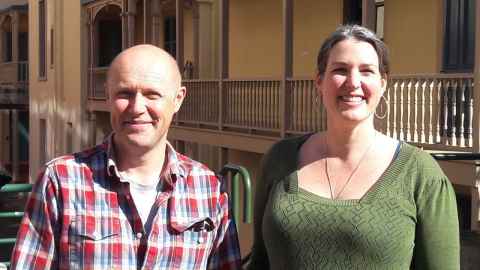Power to the people
8 August 2018
Two Arts academics have initiated New Zealand’s first forum for Local and Community Energy, meeting in Wellington later this month and funded by the Public Policy Institute.

Māori and local communities have a vital role to play in New Zealand’s transition to a low carbon economy.
That is the view of University of Auckland politics lecturer Dr Julie MacArthur and sociologist Dr Steve Matthewman who have initiated New Zealand’s first forum for Local and Community Energy, meeting in Wellington later this month.
“Māori in particular are already engaged in geothermal energy, energy efficiency and other community energy projects,” says Dr MacArthur. She has just finished mapping community-owned energy projects across New Zealand.
“For example Ngati Tuwharetoa Geothermal Assets in Kawerau is the largest provider of direct geothermal steam to industry in the world.
“It is quite unique here compared with other countries. Nowhere else in the world are indigenous people invested in, and running, geothermal projects.”
“It is quite unique here compared with other countries,” she says. “Nowhere else in the world are indigenous people invested in, and running, geothermal projects.”
At the other end of the scale, Awarua Synergy at Bluff owned by local iwi, is retrofitting homes with insulation and recently put up a small wind turbine at the Te Rūnaka o Awarua Marae.
“Collective ownership of energy assets can generate a whole lot of other positives, such as control over design, siting, reinvesting profits in the community, as well as education, jobs and training,” says Dr MacArthur.
She and Dr Matthewman are each working on Marsden-funded research projects focused on how energy infrastructures can serve social and economic as well as climate and disaster-related needs.
“Relative to its importance, energy studies is a very poorly developed area in the social sciences,” says Dr Matthewman. His project is looking at how to build renewable energies and social capital working at the local level in post-earthquake Christchurch.
“There is a lot of theory worldwide about local ownership; people are more likely to get involved if they have ownership,” he says,
“And this is about human behaviours, complex systems and vested interests.”
Adds Dr MacArthur: “People hear energy and focus on technology, often forgetting that it is people who use, fund, design, and develop the technology. The success of future energy transitions rests on understanding people, and their governments, which is what Arts academics are trained for.”
Keen to know how New Zealand can support community energy, Dr MacArthur is now doing a comparative study into how other countries are supporting local and indigenous efforts and what kinds of policies are adopted overseas to kick-start these innovations.
Media queries
Tess Redgrave | Media Adviser
Tel: 09 923 7383
Mob: 027 562 5868
Email: t.redgrave@auckland.ac.nz